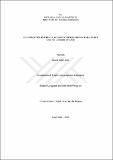DSpace Repository
COLONIZATION IN CHINUA ACHEBE’S NOVELS THINGS FALL APART AND NO LONGER AT EASE
JavaScript is disabled for your browser. Some features of this site may not work without it.
| dc.contributor.author | Aziz, Sawza Sabah
|
|
| dc.date.accessioned | 2019-05-17T09:14:22Z | |
| dc.date.available | 2019-05-17T09:14:22Z | |
| dc.date.issued | 2015 | |
| dc.identifier.uri | http://hdl.handle.net/11547/2000 | |
| dc.description.abstract | Çoğu roman farklı kültürlerde de, gelenek ve göreneklerde büyük ilgi yaratır ve çoğu romanda iki farklı kültür arasında çatışmalar görürüz. Kolonizasyon, çağdaş edebiyat eleştirilerine ve kültür tarihine de büyük ölçüde konu olmuştur. Bu çalışma, Chinua Achebe'nin “Things Falls Apart” (1958)'e ve "No Longer at Ease" (1960) romanlarında yer alan çok kültürlülüğü ele alıyor. Chinua Achebe'nin romanları, modern Afrika edebiyatının gelişmekte olan ilkeleri için çok önemlidir. Afrika toplumunun hem yaşayan bir varlık oluşunu hem de tarihteki yerini romanlarında göstermiştir. Chinua Achebe ayrıca Afrika için nelerin önemli olduğunu ve yeniden canlanan değerlerinin toplumsal modellemesini de romanlarında bize yansıtmıştır. Bu araştırma beş bölümden oluşuyor. İlk bölümde, bu araştırmanın yapılmasının ardında yatan nedenlerin yer almasıyla beraber, bu alanda çalışma yapan yazarların ve uzmanların yaklaşımlarını ve tartışmalarını içeren edebiyat da işlenmektedir. İkinci bölümün üç kısmı mevcut; ilk kısım, Kolonizasyon anlamını ve nereden geldiği üzerinde duruyor. İkinci kısımda Kolonizasyon doğan ihtiyaç ve bu fikrin oluşumunda, sömürgeciliğin nasıl bir rol oynadığı yer alıyor. Çok kültürlülük, özdeşlik ile ilişkili bir konu olduğundan, üçüncü kısımda bu önemli konu işleniyor. Üçüncü bölümde, Chinua Achebe'nin romanı Things Fall Apart işlenmektedir. Bu bölüm de üç kısımdan meydana geliyor. Birinci kısımda, romandaki Kolonizasyon konusu işlenirken, ikinci kısımda ise sömürge ve sömürgeci konusu ele alınıyor. Üçüncü kısım, romandaki faşizmi inceliyor. Araştırmanın dördüncü bölümü, Achebe'nin diğer romanı No Longer at Ease'i ele alıyor. Diğer bölümlerde olduğu gibi, bu bölüm de üç kısımda inceleniyor. İlk kısım gelenek çarpışmalarına ışık tutarken, ikinci kısım ise kimlik çatışmalarına yer vermektedir. Bu bölümün son kısmı, romandaki "kendi kendini yok etme eğilimleri" üzerinde duruyor. Beşinci bölüm, araştırma sonuçlarını ve bulgularını özetliyor ve ardından bu araştırmayı yürütmemde bana yararlı olan kaynakları listeleyerek son buluyor. | tr_TR |
| dc.language.iso | en | tr_TR |
| dc.publisher | ISTANBUL AYDIN UNIVERSITY INSTITUTE OF SOCIAL SCIENCES | tr_TR |
| dc.subject | Kolonizasyon | tr_TR |
| dc.subject | İngiliz sömürgeciler | tr_TR |
| dc.subject | Kimlik | tr_TR |
| dc.subject | Gelenek | tr_TR |
| dc.subject | Clash | tr_TR |
| dc.subject | Tanıma | tr_TR |
| dc.subject | Colonization | tr_TR |
| dc.subject | British colonialists | tr_TR |
| dc.subject | Identity | tr_TR |
| dc.subject | Tradition | tr_TR |
| dc.subject | Clash | tr_TR |
| dc.subject | Recognition | tr_TR |
| dc.title | COLONIZATION IN CHINUA ACHEBE’S NOVELS THINGS FALL APART AND NO LONGER AT EASE | tr_TR |
| dc.type | Thesis | tr_TR |
| dc.description.abstractol | Many novels display an intense interest in culture, traditions and the conflict between two different cultures. Colonization is a topic which is also a major concern of contemporary literary criticism and cultural history at large. The present study is concerned with the issue of Colonization in Chinua Achebe's novels Things Fall Apart (1958) and No Longer at Ease (1960). Chinua Achebe's novels are important to the emergent principle of modern African literature. His novels provide an image of an African society, represented both as a living entity and in its historic circumstance. He also provides an image of a social structure modelling the institutional foundation of the re-establishing of African meanings and values. This study is divided into five chapters. Chapter one which is the introduction examines the reasons behind writing this study and review of the literature which illustrates the approaches and arguments of scholars and authors in this area. Chapter Two has three sections. Section one is devoted to uncovering the process of colonization, and its impact. In Section Two the topic of colonialism is discussed in relation to its role in creating the idea of culture diversity. Since the issue of colonization is related to identity, Section Three is devoted to tackling this important issue. Chapter Three is dedicated to the study of Chinua Achebe‟s novel, Things Fall Apart. It also has three sections. Section One is dedicated to a discussion of the issue of colonization in the novel, while Section Two is concerned with the relationship between the colonized and colonizer. Section Three examines the issue of racism in the novel. Chapter Four of the study examines Achebe's novel, No Longer at Ease. As in the other chapters it is also divided into three sections. The first maps the clash between traditions in the novel. The second section studies the conflict of identities. The last section of this chapter is dedicated to dealing with self-destructive tendencies in the novel. Chapter Five concludes the thesis summing up the findings of the study, and is followed by a list of consulted. | tr_TR |
| dc.publisher.firstpagenumber | 1 | tr_TR |
| dc.publisher.lastpagenumber | 72 | tr_TR |
Files in this item
This item appears in the following Collection(s)
-
Tezler -- Thesis [3470]
